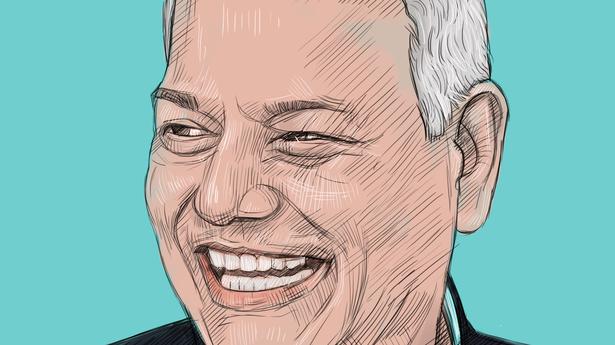
Yashwant Sinha | A career of many turns
The Hindu
The former BJP leader is the Opposition’s face in the presidential race
Yashwant Sinha’s political career has come full circle. From being a trenchant critic of the Congress and the Left as a BJP leader for over two decades to a joint Opposition candidate in the July 18 Presidential election, supported by both.
Mr. Sinha was born in Patna on November 6, 1937, as the ninth of 11 siblings. His father was an advocate in the Patna High Court. At the age of 23, Mr. Sinha joined the Indian Administrative Service and was allotted the Bihar cadre. Fourteen years into the job, in 1974, answering the call for “Total Revolution” from Jai Prakash Narayan, Mr. Sinha wanted to quit the service. He writes in his autobiography, Relentless, that he was dissuaded by the family that was solely dependent on his salary and many leaders, including JP himself.
The high point of his bureaucratic career was his term as Principal Secretary to Bihar Chief Minister and socialist Karpoori Thakur, in 1977. In 1984, while serving as Joint Secretary in the Union government, he resigned to join politics. Through a mutual friend, he met Chandra Shekhar, who was heading the Janata party. Chandra Shekhar was his first mentor and guide. After his disastrous defeat from Hazaribagh in the 1984 general election, in 1988, Chandra Shekhar ensured that Mr. Sinha found a Rajya Sabha berth. When Chandra Shekhar became Prime Minister in November 1990, Mr. Sinha was picked as his Finance Minister — at a time when the country was going through its worst financial crisis. Had he known the actual magnitude of the problem, Mr. Sinha writes in his biography, he would not have taken the assignment. He earned the contentious distinction of being a Finance Minister who mortgaged gold abroad as security for a forex loan. The loan had become necessary because India had reserves to fund only three weeks of imports.
By the early 1990s, Chandra Shekhar’s political fortunes were sliding and with no future in sight for himself, Mr. Sinha drifted to the BJP. He left his first mentor at his lowest ebb. In 1993, a day after Deepavali, Mr. Sinha joined the BJP, which L.K. Advani termed a “Diwali gift” for the party. He had a promising start. Soon after joining the BJP, he was made an invitee to the party’s national executive. Mr. Advani remained his biggest supporter and shielded him from criticism for his non-RSS background. He led the BJP legislature party in Bihar, where he was chosen over Sushil Modi.
He had to resign from the position after his name figured in the hawala case, but the party compensated him with the position of national spokesperson. The rewards kept coming in. In the 1998 Atal Bihari Vajpayee government, the Prime Minister was keen on appointing Jaswant Singh as Finance Minister, but he had lost the election. Mr. Advani persuaded Vajpayee to allot the portfolio to Mr. Sinha instead.
Though Mr. Advani was his closest ally in the BJP, Mr. Sinha was the first to attack him for his “Jinnah was a secular person” remark that he made in June 2005. Mr. Advani’s remarks eventually led to his resignation as the BJP president in December that year.
When Mr. Sinha was asked if Mr. Advani’s resignation would create a vacuum in the BJP, he said the BJP would only emerge stronger. Though, Mr. Sinha insists that his comments were not a personal attack but only ideological difference- the deed was done. The cord was broken. He bitterly complains in his autobiography that he missed the opportunity to become the party’s leader in the Lok Sabha because of this episode.











